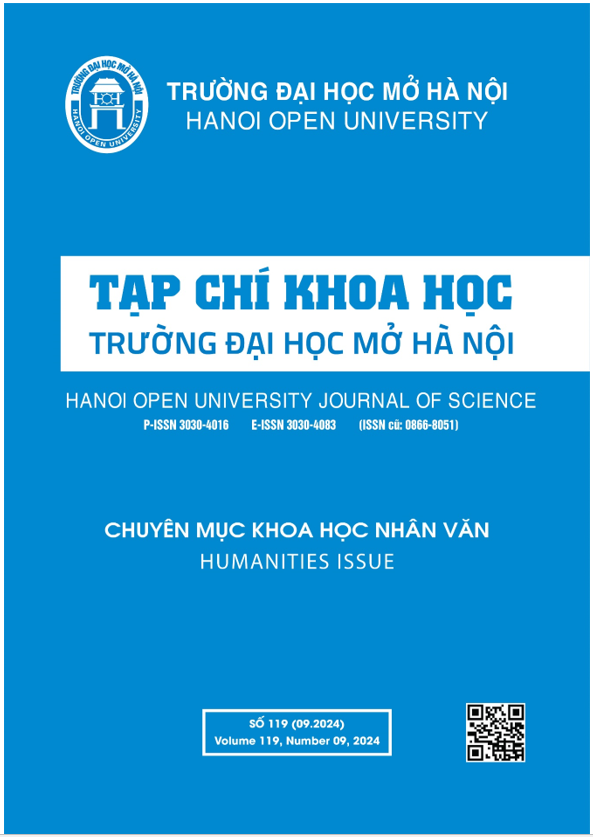A VOCABULARY LEARNING STRATEGY INVESTIGATION ON ESP MAJORED-STUDENTS AT THE UNIVERSITY OF ECONOMICS TECHNOLOGY FOR INDUSTRIES (UNETI)
DOI:
https://doi.org/10.59266/houjs.2024.462Từ khóa:
Reality, self-study English vocabulary learning strategies, ESP students, improving language skillsTóm tắt
Learning vocabulary is crucial to improving students' English language proficiency. Nevertheless, there are several reasons why vocabulary acquisition techniques aren't applied well. This study aims to look into how 100 ESP students at the University of Economics Technology for Industries (UNETI) are now employing these tactics to improve their language skills and expand their vocabulary. Lastly, some recommendations will be made to assist teachers in resolving these issues and enhancing the potency of vocabulary acquisition techniques.
Tài liệu tham khảo
[1]. Allen,V.F.(1983).Techniques in teaching vocabulary. New York: Oxford University Press. De Vau, D. (2002).
[2]. Bennett, P. (2006). An Evaluation of Vocabulary Teaching in an Intensive Study Programme. Unpublished MA Thesis. The University of Birmingham, Birmingham. The United Kingdom [3]. Candy, P. (1988). On the attainment of subject matter autonomy. In D. Boud(Ed.). Developing student autonomy in learning (2nd Edition). New York: Kogan, pp. 59-76.
[4]. Dolati, I & Mikaili, P. Effects of Language Games on Facilitating Students’ Vocabulary Learning. Australian Journal of Basic and Applied Sciences, 5(11): 1218-1224, 2011. ISSN 1991-8187)
[5]. Gu, Y. (2003). Vocabulary learning in the second language: Person, task, context, and strategies. Electronic Journal. TESL-EJ, 7(2), 1-26
[6]. Gu, Y., & Johnson, R. K. (1996). Vocabulary learning strategies and language learning outcomes. Language Learning, 46, 643-697.
[7]. Naiman, N., Frohlich, M., Stern, H. H., & Todesco, A. (1978). A good language learner. Ontario Institute for Studies in Education.
[8]. Nation. L.S.P (1990) Learning and teaching vocabulary. Boston.
[9]. Nguyễn Cảnh Toàn (2001). Học và dạy cách học. NXB Giáo dục.
[10]. Nguyễn Cảnh Toàn (1999). Luận bàn kinh nghiệm về tự học. NXB Giáo dục.
[11]. Mức từ vựng và chiến thuật học từ vựng của Sinh viên năm nhất chuyên ngành tiếng Anh chính quy trường ĐHNN-ĐHQGHN: Ngô Xuân Minh
[12]. Oxford, R. L. (1990). Language learning strategies: What every teacher should know. Newbury House.
[13]. O’Malley, J. M., & Chamot, A. U. (1990). Learning strategies in second language acquisition. Cambridge University Press.
[14]. Rubin, J. (1981). Study of cognitive processes in second language learning. Applied Linguistics, 11(2), 117-131. https://doi.org/10.1093/applin/II.2.117
[15]. Sanprasert, N. (2010). The application of a course management system to enhance autonomy in learning English as a foreign language. System, Vol. 38, pp. 109-123. An International Journal of Educational Technology and Applied Linguistics.
[16]. Schmitt. N (1997) Vocabulary learning strategy. Cambridge. Cambridge University Press.
[17]. Schmitt & M. McCarthy (Eds.), Vocabulary: Description, acquisition, and pedagogy (pp. 199-227). Cambridge University Press.
[18]. Schmitt, N. (2000). Vocabulary in language teaching. Cambridge University Press.
[19]. Thornbury.S (2002) How to teach vocabulary. Malaysia.Longman Group Lmt.
